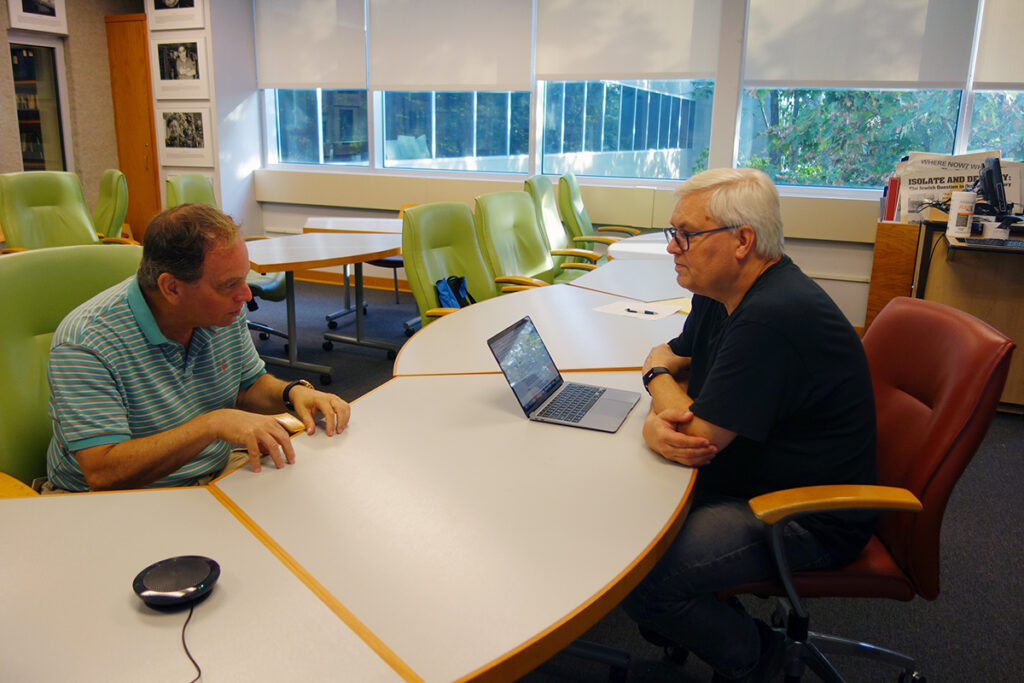 Stockton/Stockton University Associate Professor of History Michael Hayse, right, interviews Jack Aal, second generation after the Holocaust.
Stockton/Stockton University Associate Professor of History Michael Hayse, right, interviews Jack Aal, second generation after the Holocaust.
GALLOWAY TOWNSHIP - When Stockton University Professor Michael Hayse and interested students started work in 2019 on a project to catalog South Jersey Holocaust survivors, he thought it would take about a year.
I thought there might be a few hundred, but the number of names just grew and grew, the associate professor of history said. We were quickly in the hundreds, and it was clear we were going to go into the thousands.
Over the last three years, the Sara & Sam Schoffer Holocaust Resource Center project to create the Holocaust Survivors of South Jersey Digital Archive and Website has grown to involve hundreds of students and include over 1,500 names of people who lived in Atlantic, Cape May and Cumberland counties.
The center will officially launch the archive and website at an event at 12:30 p.m. Sunday, Sept. 18 in Stockton's Campus Center Event Room. The event will include a buffet dairy lunch. Those interested in attending need to RSVP to Gail Rosenthal, the center's director, at 609-652-4699 or [email protected].
Hayse said two main components of the project will be launched the digital archive that will reside at the center and a website featuring individual profiles of some survivors. The digital archive contains documents, copies of memoirs and ancestry information that researchers and Holocaust survivors' family members can search and access. The website will be a searchable database featuring between 50 and 75 profiles of survivors.
Both the archive and the website will be regularly updated as new profiles are completed about survivors.
It will never really be done because there are always going to be stories to tell, Hayse said. We are constantly getting more information and new people coming forward to talk to us.
He added that during interviews, students and researchers would ask if the Holocaust survivor family knew other survivors' families.
Some we already had and some were new to us. Rather than moving closer to be done, every interview it seemed like we had more to do, Hayse said.
But even with all the work, Hayse said it's been a rewarding experience to document these stories as more survivors are passing away with the march of time.
If we don't get these stories now, they could be lost, he said.
One of the other benefits of the project has been getting students involved. One component of the larger project was launched in April when senior George Quinn presented a website on businesses owned and operated by South Jersey Holocaust survivors.
(The archive) is both a project that aims to document the stories of Holocaust survivors for historical purposes, but it's also a way to engage students in the documentation of history, the telling of historical narratives and get them to understand hands-on research, Hayse said.
In addition to stories of more survivors being added to the archive, there are future plans to expand the project. In the fall of 2023, the center plans on releasing a digital exhibition that will present a more comprehensive look at the Holocaust, refugee issues and the positive impact of Holocaust survivors on South Jersey.
Hayse also hopes the September gathering at Stockton will be an opportunity for families of area Holocaust survivors to reconnect.
We have seen many people, second-generation survivors, who grew up in this area and many of them haven't seen each other in a long time, he said. It's almost like a high school reunion where people are getting back together and remembering this.
Most of their children have been interested in the history of their Holocaust survivor family, and now this is a way for the second and third generations after the Holocaust to learn more about the stories of their parents and other family members before, during, and after World War II.